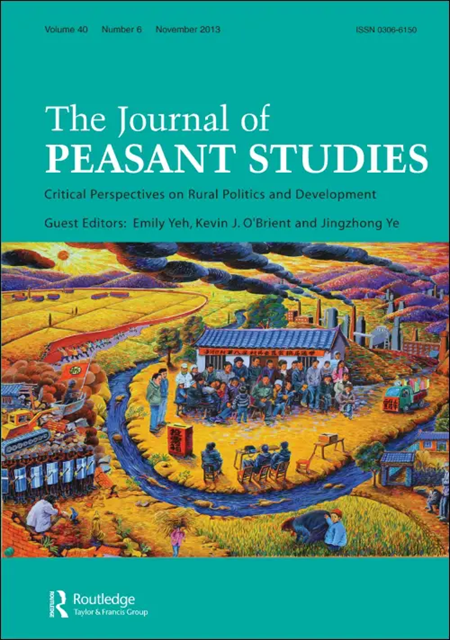西北地区的橡胶种植园:重新思考越南土地掠夺的概念
IF 4.8
1区 社会学
Q1 ANTHROPOLOGY
引用次数: 33
摘要
乍一看,越南西北部的橡胶种植园与“大规模土地征用”并没有什么不同,而“大规模土地征用”在全球南方国家很常见。然而,当我们仔细研究种植园中有多少过程起作用时,我们可以看到,除了跨国或国内公司购买或租赁土地种植粮食、纤维或燃料作物的其他国家发生的那些过程之外,还有许多不同的过程在起作用。橡胶种植园得到了政府的大力支持,并作为一种工业化和现代化的方式来推广,同时声称可以缩小高地和低地之间的经济差距。通过在松罗两个村庄的实地考察,以及对政策文件和文件的审查,本文确定了政治机制和政策,这些机制和政策已成为越南为发展社会主义方向的市场经济而剥夺土地的关键因素。本文试图理解对土地和对政治主题讨论的制度性控制是如何产生控制的。它认为,在越南西北部抢夺橡胶种植园的土地是加强国家主权的举措。这种土地征用确实创造了一种新的土地治理方式,这在越南迄今为止还不存在。本文章由计算机程序翻译,如有差异,请以英文原文为准。
Rubber plantations in the Northwest: rethinking the concept of land grabs in Vietnam
At first glance, rubber plantations in the Northwest of Vietnam do not appear so different from ‘large-scale land acquisition’, which is quite common in the Global South. However, when we closely examine how many processes in plantations work, we can see that there are many different processes at work besides those that take place in other countries where transnational or domestic corporations purchase or lease land for growing food, fibre or fuel crops. Rubber plantations have been strongly supported by the government and promoted as a way to industrialize and modernize the uplands, while claiming to narrow the economic gap between the uplands and lowlands. Drawing on fieldwork in two villages in Son La, and on a review of policy papers and documents, this paper identifies the political mechanisms and policies that have emerged as critical factors enabling the dispossession of land for the development of a market economy with a socialist orientation in Vietnam. The paper seeks to understand how institutional control over land and over the discussion of political subjects produces control. It argues that land grabs for rubber plantations in Northwest Vietnam are moves to strengthen state sovereignty. This land seizure has indeed created a new way of land governance that hitherto did not exist in Vietnam.
求助全文
通过发布文献求助,成功后即可免费获取论文全文。
去求助
来源期刊

Journal of Peasant Studies
Multiple-
CiteScore
10.50
自引率
17.60%
发文量
99
期刊介绍:
A leading journal in the field of rural politics and development, The Journal of Peasant Studies (JPS) provokes and promotes critical thinking about social structures, institutions, actors and processes of change in and in relation to the rural world. It fosters inquiry into how agrarian power relations between classes and other social groups are created, understood, contested and transformed. JPS pays special attention to questions of ‘agency’ of marginalized groups in agrarian societies, particularly their autonomy and capacity to interpret – and change – their conditions.
 求助内容:
求助内容: 应助结果提醒方式:
应助结果提醒方式:


